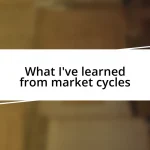Key takeaways:
- Index funds provide a low-cost, simple way to invest in a diversified portfolio, reducing the complexity and stress associated with choosing individual stocks.
- There are various types of index funds, including Total Market, S&P 500, International, Bond, and Sector-Specific, allowing investors to align their choices with personal financial goals and risk tolerance.
- Common misconceptions about index funds include the ideas that they are too simplistic for high returns, only suitable for passive investors, and that they limit individual stock gains; however, they often outperform actively managed funds and emphasize the benefits of diversification.
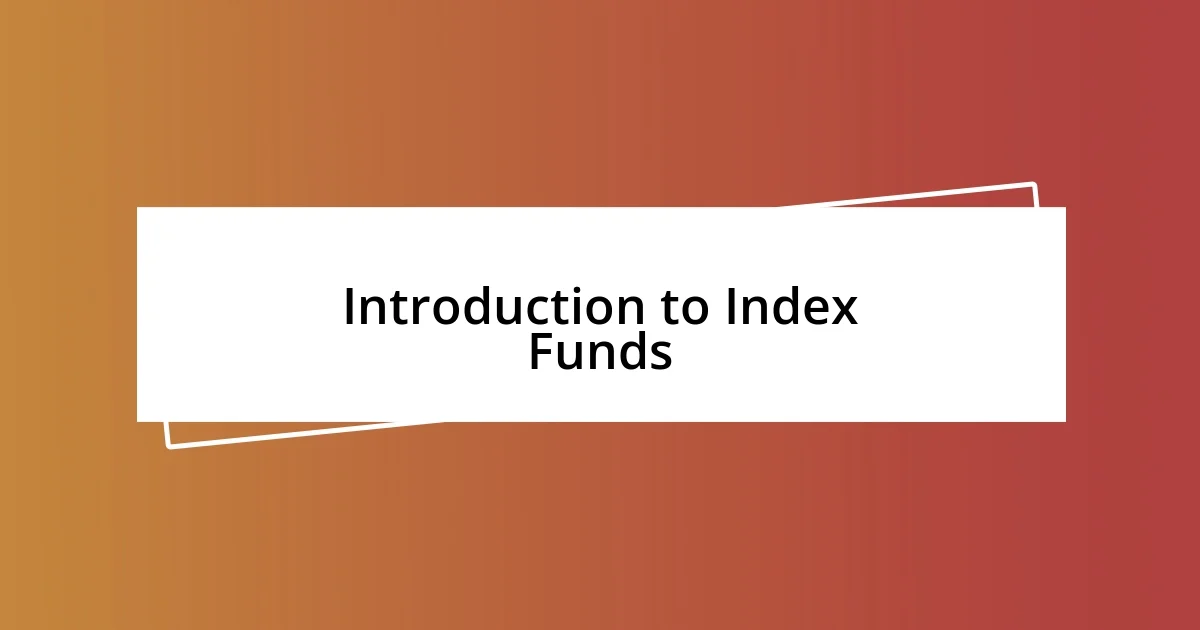
Introduction to Index Funds
Index funds have become increasingly popular among investors, and for good reason. They offer a straightforward way to gain exposure to a wide range of stocks or bonds, often at a much lower cost than actively managed funds. I remember the first time I stumbled upon an index fund; it felt like discovering a hidden treasure in the vast ocean of investment options.
When I started investing, I was overwhelmed by the market’s complexity. But index funds made it easier for me to grasp the basics. For instance, rather than trying to pick individual stocks—a daunting and sometimes risky endeavor—I found comfort in knowing that index funds simply aim to replicate the performance of a market index. Isn’t it refreshing to think about investing in a more simplified manner?
Moreover, what struck me was their consistent performance over time. While markets fluctuate, index funds generally rise alongside the market, which resonated with my belief in long-term investing. Have you ever felt the anxiety of wondering where to put your money? With index funds, I found a pathway that not only reduced my stress but also aligned with my goal of building wealth gradually.
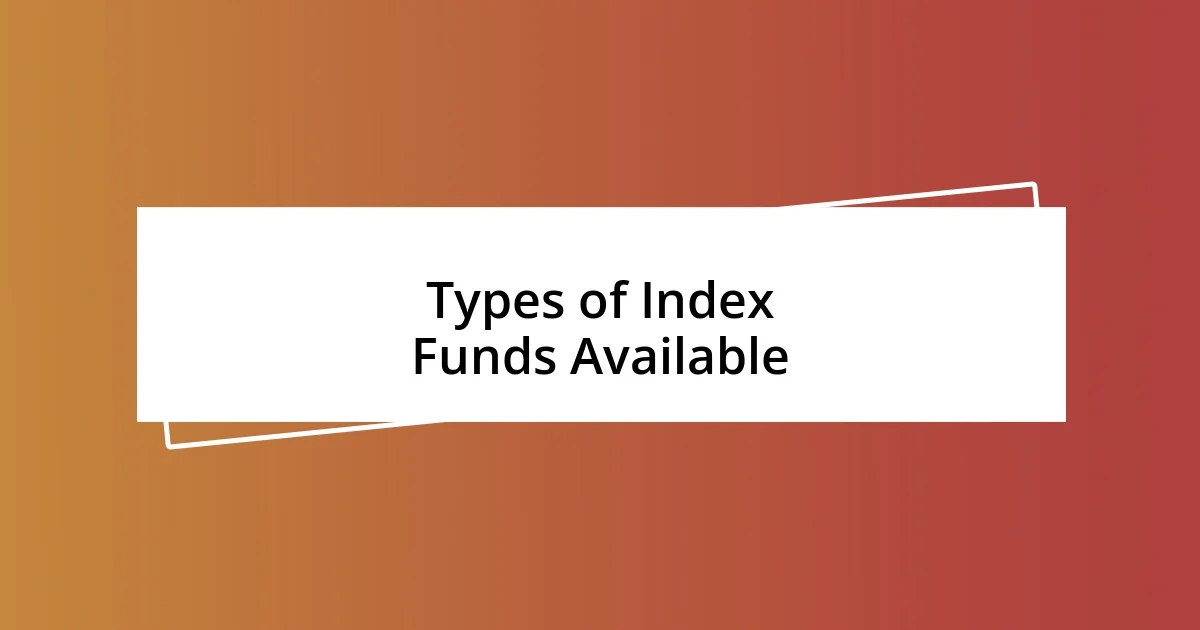
Types of Index Funds Available
When diving into the realm of index funds, you’ll discover a variety of options catering to different investment preferences and strategies. The diversity among index funds means there’s likely a perfect fit for nearly every investor. Personally, I appreciate how these types can help align with my financial objectives.
Here are some common types of index funds available:
-
Total Market Index Funds: These funds aim to capture the entire stock market, providing exposure to small, medium, and large companies. I still remember how liberating it felt to know I was investing in thousands of companies at once!
-
S&P 500 Index Funds: Targeting the 500 largest companies in the U.S., these funds have a solid reputation. It gave me a sense of security to know I was part of a portfolio that included some of the most reputable names in the industry.
-
International Index Funds: These funds focus on markets outside the United States, offering a chance to diversify geographically. This option has always intrigued me, as I believe it’s vital to not put all your eggs in one basket, especially in a global economy.
-
Bond Index Funds: Aimed at replicating the performance of various bond indices, these funds can provide a balance between riskier stock investments and safer options. Incorporating bond funds into my portfolio helped me feel more balanced and less exposed to stock market volatility.
-
Sector-Specific Index Funds: Catering to specific industries, these funds allow investors to capitalize on growth in particular sectors, like technology or healthcare. I remember when I first invested in a tech-focused fund; it felt like I was joining the forefront of innovation!
Every type of index fund carries its unique characteristics, which is why it’s crucial to consider your financial goals and risk tolerance before diving into any specific option. The right fund could make your investment journey smoother and more aligned with your aspirations.
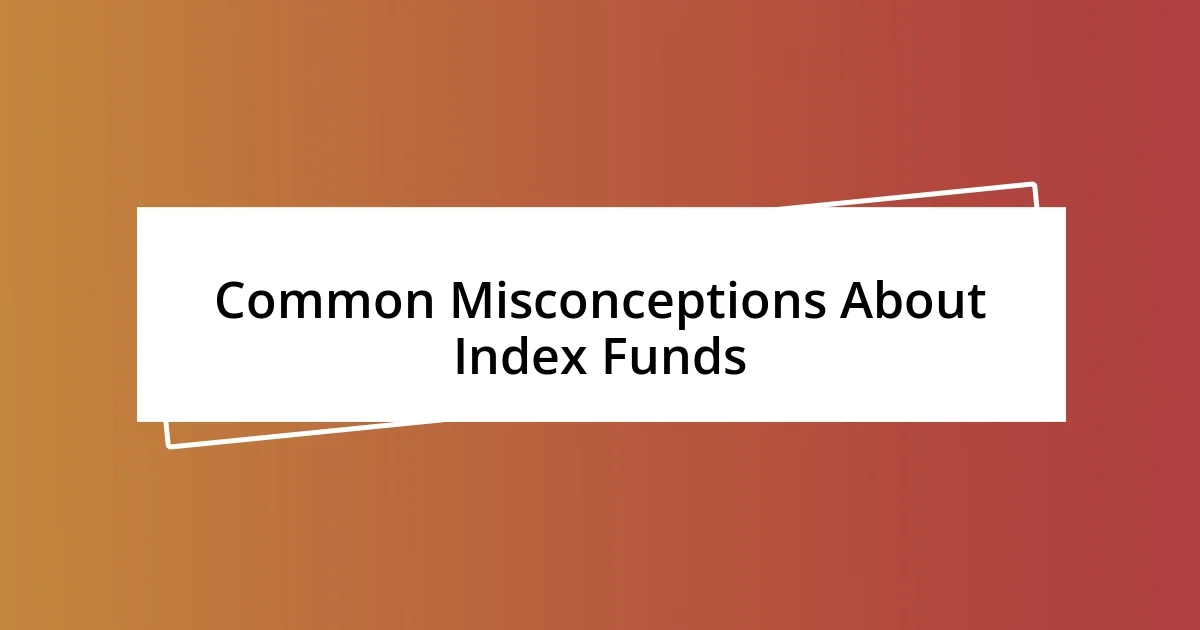
Common Misconceptions About Index Funds
When discussing index funds, it’s easy to stumble upon misconceptions. One of the biggest myths I’ve encountered is the belief that index funds are too simplistic and lack potential for high returns. In my experience, this couldn’t be further from the truth. While they do follow the market, I’ve seen firsthand how they often outperform actively managed funds over the long term. It’s like taking the scenic route—you may not be speeding, but you’re enjoying the view and sometimes, it leads you to unexpected treasures.
Another common misconception is that index funds are only for passive investors. Many people think you must be the type who simply lets their investments sit without engaging. Personally, I’ve found that my approach with index funds actually encourages me to stay informed and involved. I regularly monitor market trends and adjust my asset allocation as needed. This balance of passivity and engagement offers me the best of both worlds.
Lastly, I frequently hear concerns about the lack of individual stock picking in index funds. Some fear they’re missing out on potential gains offered by standout companies. However, I’ve learned that even if you’re not handpicking stocks, you’re still part of a broad collection of investments. After all, diversification can be a powerful ally. Rather than focusing solely on individual success stories, I’ve embraced the collective strength of the entire index, leading to smoother growth over time.
| Misconception | Reality |
|---|---|
| Too simplistic; low returns | Often outperforms actively managed funds over time |
| For passive investors only | Encourages involvement and staying informed |
| Missing out on individual stock gains | Diversification offers collective strength; minimizes risk |
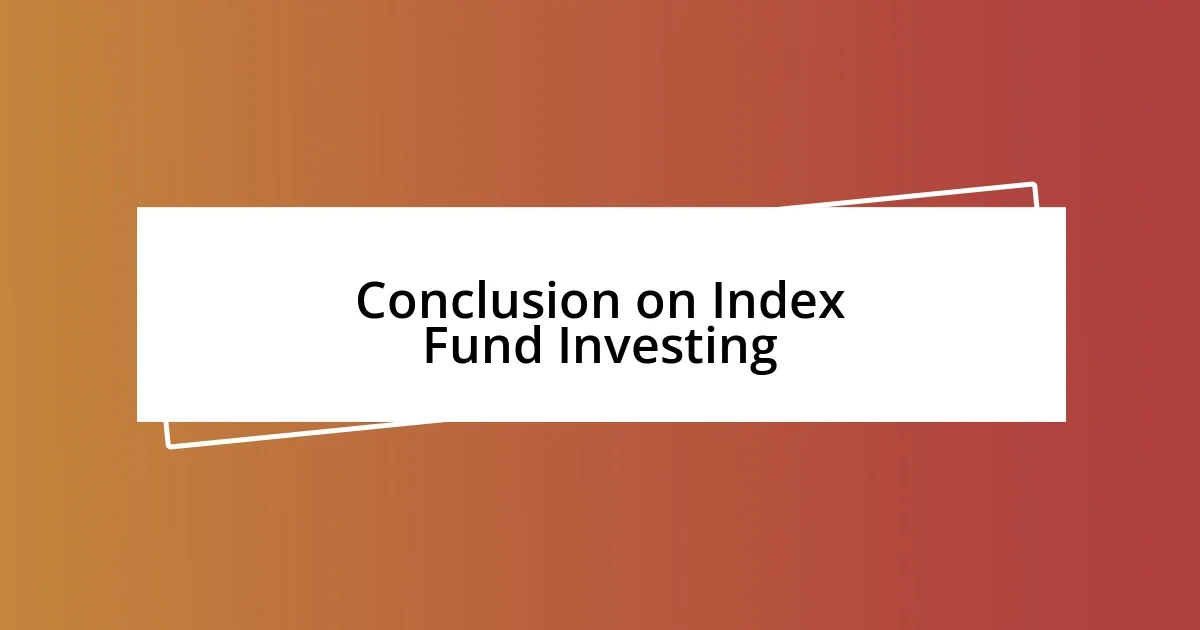
Conclusion on Index Fund Investing
Investing in index funds has been a transformative experience for me. Their simplicity and efficiency have not only made investing accessible but have genuinely removed much of the stress associated with managing a portfolio. I often find myself reflecting on how my financial journey began to feel less like a daunting climb and more like a pleasant stroll once I introduced index funds into my strategy. Have you ever felt overwhelmed by investment choices? If you have, I can assure you that index funds simplify the process immensely.
One aspect that stands out to me is the long-term growth potential of index funds. I remember the initial skepticism I had about these funds due to their passive nature. However, witnessing the steady compounding of returns over the years has been nothing short of rewarding. It’s like planting a tree and patiently waiting for it to bear fruit; the effort is minimal, but the payoff can be substantial. Have you considered how a patient approach could lead to significant gains in your own financial journey?
Ultimately, my experience has taught me that index fund investing is not just about numbers and charts; it’s about building a foundation for financial freedom and peace of mind. It encourages a healthier relationship with money, where I focus on the long game rather than short-term fluctuations. This shift in mindset has allowed me to sleep better at night, knowing my investments are working for me. Isn’t it comforting to think that you can actively shape your future through such a straightforward and powerful strategy?










